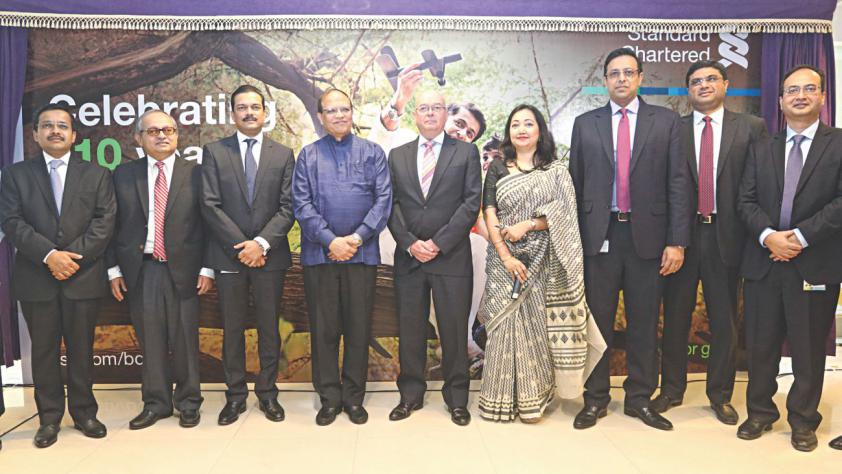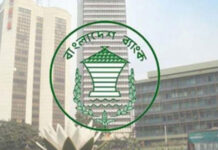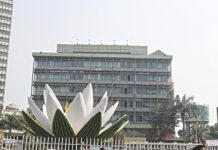The UK-based bank celebrates 110 years in Bangladesh
Standard Chartered has relaunched a collateral-free loan programme for Bangladeshi women entrepreneurs as part of its efforts to bulk up presence in all segments of its clientele in the country.
The product will offer the country’s cash-strapped women entrepreneurs up to Tk 1 crore in loans, the highest collateral-free credit for women in South Asia.
Roksana Hussain, owner of Ananda Restaurant, a bakery in Narayanganj, received a cheque for Tk 40 lakh loans from the bank at a ceremony organised to celebrate its 110th anniversary in the country.
Phowzia Khan’s Petro Products Company, which imports CNG conversion kits from Italy, Dubai and Korea, got a loan of Tk 1 crore.
Bangladesh Bank Governor Atiur Rahman and British High Commissioner to Bangladesh Robert W Gibson cut a cake to start the celebration at the bank’s head office in Gulshan.
“Women are the best managers of money. They are least defaulter. They use the profit for kids and families,” Rahman said.
He termed the UK-based bank a good partner of the country, saying the bank is contributing significantly towards the economic development of Bangladesh through innovation of new financial products, facilitating banking, and promoting employment generation.
Rahman urged the bank to take steps so that non-resident Bangladeshis can invest online in premium bonds in the country.
He said for some years now, the central bank has been instilling socially responsible financing ethos in the entire banking sector, to realise its vision of high and inclusive economic growth with rapid poverty alleviation.
The financial inclusion campaign from the central bank targeting farm and off-farm productive economic activities is thus the major driver of inclusive growth, he said.
The governor also talked about the central bank’s role in promoting environment-friendly growth, rapid digitisation in the banking sector, widening of mobile financial services and no-frills accounts for disadvantaged population segments. “I am happy to say that Standard Chartered has been an active player in this campaign, with many humanitarian activities,” he said.
Robert Gibson said the footprint of 110 years is a remarkable achievement for the bank. “It has raised financing for projects that are important for Bangladesh’s growth and development.”
Abrar A Anwar, chief executive of Standard Chartered Bangladesh, said the bank never closed its doors even during the most difficult periods facing the world. “It is a testimony to our confidence in growth and development of this market.”
He said the bank assisted the central bank with reconstruction of the records that were damaged during the Liberation War and with setting up of the exchange rate mechanism. The bank also organised three investment summits on Bangladesh to relay the real stories of Bangladesh to foreign investors and bring more foreign investment to the country.
“We will not stop here. This will continue to be on the top of our agenda in the days to come,” Anwar said.
Aditya Mandloi, head of retail clients at the bank, said they would bring more innovative products for women entrepreneurs in the coming years.
Standard Chartered, which sees Bangladesh as one of its top 10 markets among 70 countries where it has operations, started its journey in Bangladesh in 1948 by opening its first branch in the port city of Chittagong.
In August 2000, the bank completed the acquisition of Grindlays Bank and inherited the Grindlays Bank’s presence in the country that dates back to 1905, thus becoming the oldest and the leading international bank in Bangladesh in the process. Standard Chartered handles more than $3 billion a year in garment exports. It finances backward linkage and textile sectors so that the apparel manufacturers can widen their reach.
The bank has also arranged financing for 30 percent of the country’s more than 10,000 megawatts of installed capacity of electricity, which is crucial for the economy. It is also a major player in the telecom sector financing.
The largest international bank in Bangladesh has 26 branches and booths and 83 ATMs and employs 2,000 people. It is the only foreign bank in the country with presence in six cities: Dhaka, Chittagong, Khulna, Sylhet, Bogra and Narayanganj. Its asset based in Bangladesh is worth $4 billion. Standard Chartered directly supports 1.1 percent and indirectly 1.5 percent of Bangladesh’s gross domestic product, a 2013 independent study found.
Through its onshore financing, the bank supports, directly and indirectly, 466,000 jobs in Bangladesh, equivalent to about 0.6 percent of the country’s total workforce.
When the bank’s lending to financial institutions is included, its impact amounts to 655,000 jobs, or 0.9 percent of the labour market.
Source: The Daily Star










